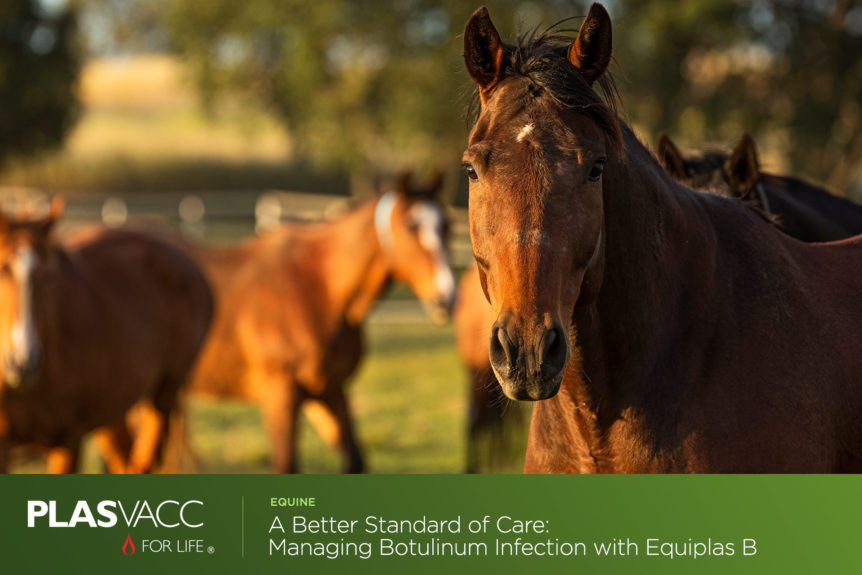What is Botulism?
Botulism is a serious condition resulting from bacterial infection by Clostridium botulinum. While botulism can affect all mammals including humans, horses—both adults and foals—are particularly susceptible due to their heightened sensitivity to the neurotoxins produced by the bacteria, which, if untreated, can lead to paralysis and death.
Ubiquitous on nearly all continents, botulism-causing bacteria are commonly found in soil, however, these bacteria only produce neurotoxins in certain conditions such as moist, low-oxygen environments.
Most adult horses are exposed to the neurotoxin as a result of eating spoiled food, such as hay or other forage that was harvested or stored improperly.
Once ingested, the botulinum toxin binds to nerve cells, blocking the communication between nerves and muscles, resulting in progressive flaccid paralysis and reduced muscle strength.
Strains of C. botulinum can produce seven distinct neurotoxin types (A through G), which are generally specific to certain geographic areas, however, not all of these neurotoxin types are toxic to horses. Types A, B, and C are linked to equine illness, though type A toxicity is uncommon. Type B is one of the most commonly encountered toxins in the United States, especially in Kentucky and other mid-Atlantic states.
Clinical Signs and Diagnosis
Catching botulinum infections before they progress too far is paramount in ensuring the best chance of successful treatment and discovery.
The primary indicator of botulinum toxicity is flaccid paralysis, characterized by:
- General weakness with decreased muscle tone
- Stiff, labored gait progressing to muscle tremors and extreme weakness
- Increased time spent lying down, progressing to recumbency
- Dilated pupils, weakened blink
- Trouble chewing and swallowing
- Decreased tail tone
How Can Equiplas B Help Botulinum Infection Outcomes?
While the prevention of botulinum infections is the best line of defense and is accomplished via vaccination, many owners and breeders still choose not to vaccinate against botulism. In this scenario, for infections without intervention, the mortality rate may climb to as high as 90% in adult horses.
Equiplas B is USDA licensed antitoxin for Clostridium botulinum Type B, the most common type of botulinum infection in horses in the United States and Europe.
Once administered, the antitoxin binds to any circulating neurotoxin, preventing further binding to neurotransmitters.
When a horse is suspected of having contracted botulism, the source of infection is usually unknown. It is therefore advisable to prophylactically treat any horses that may have been exposed to the same food or water source as the affected animal. If a horse has ingested the toxin, but is not yet manifesting clinical symptoms, prophylactic administration of Equiplas B will prevent or greatly reduce signs of the disease.
With early antitoxin treatment, survival outcomes are greatly increased, with treated horses who are still able to stand at the time of treatment experiencing survival rates upwards of 90%. For horses who are recumbent at time of treatment survival rates fall to nearly 50%, though this still represents a nearly two-fold increase over non-intervention, illustrating the importance of early diagnosis and treatment.
For more information on Equiplas B, be sure to check out the product page and download the product information sheet. Plasvacc’s on-staff technical vet is also available to answer any product questions.
References:
Young, A. (2021, November 19). Botulism. UC Davis School of Veterinary Medicine. Retrieved September 8, 2022, from https://ceh.vetmed.ucdavis.edu/health-topics/botulism
Johnson AL, McAdams-Gallagher SC, Aceto H. Outcome of adult horses with botulism treated at a veterinary hospital: 92 cases (1989-2013). J Vet Intern Med. 2015 Jan;29(1):311-9. doi: 10.1111/jvim.12502. Epub 2014 Nov 19. PMID: 25408202; PMCID: PMC4858097.
Shepard, L. (2014, August 29). Botulism in horses: What are the chances of Survival? Horsetalk.co.nz. Retrieved September 8, 2022, from https://www.horsetalk.co.nz/2014/08/21/botulism-horses-chances-survival/

